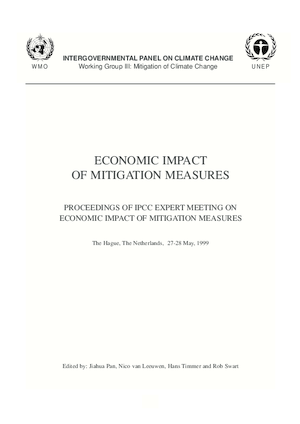Economic impact of mitigation measures; proceedings of Intergovernmental Panel on Climate Change; Working Group III, The Hague, 27-28 May, 1999
Climate change policies will affect many facets of the global economy
How do these policies affect countries that do not comply with restrictions on emissions? What are the consequences of possible future agreements, going beyond the Kyoto Protocol?
To address these questions an IPCC (Intergovernmental Panel on Climate Change) Expert Meeting was organised in the Hague on 27-28 May, 1999, hosted by CPB Netherlands Bureau for Economic Policy Analysis. The meeting was co-organised by the Energy Modelling Forum at Stanford University, a large network of model builders. The papers and a summary of the discussions are now available in the book: ‘Economic impact of mitigation measures: proceedings of IPCC expert meeting on economic impact of mitigation measures', edited by Jiahua Pan, Nico van Leeuwen, Hans Timmer en Rob Swart.
Some of the main conclusions of the study are
- The Clean Development Mechanism (CDM) is viewed as an opportunity to use cost-effective mitigation options in developing countries that are yet to be committed to restrictions. However, at the same time researchers point at some serious pitfalls. While trade in emission rights is verifiable and efficient, this is not necessarily true for trade on the basis of emission reductions. The reason is that also with hindsight the realized reduction is uncertain, because it will be difficult to estimate energy use without those CDM-projects. Another point of concern is that CDM may cause additional so-called carbon leakage in developing economies (increased emissions in other sectors). Also the institutional and bureaucratic barriers, leading to high transaction costs, are emphasised.
- Although the quantitative relevance of carbon leakage is still very uncertain, most researchers expect a leakage rate of about 20%. That means that 20% of reductions in emissions are reversed as a result of increased emissions elsewhere. Crucial determinants of leakage are:
- the relative magnitude of countries that do not comply with restrictions
- the trade intensity between developed and developing countries
- the price elasticity of energy supply.
- Interregional trading of emission rights is considered to be an effective way to reduce costs. However, the value of the rights could be so large that trade in emission rights could destabilise international capital markets.
- A general conclusion of the book is that the focal point should not be only the Kyoto Protocol, but that the broader perspective of more comprehensive future agreements is required. First, because it is still highly uncertain that the Kyoto Protocol will be ratified, as was emphasised by Jonathan Pershing, the negotiator for the US in Kyoto. Second, because climate change policies are only effective if more countries comply with restrictions on emissions.
Read also the accompanying press release.
What is the impact of international trade in "emission rights" on capital markets? How do these policies affect countries that do not comply with restrictions on emissions? What are the consequences of possible future agreements, going beyond the Kyoto Protocol?
To address these questions an IPCC (Intergovernmental Panel on Climate Change) Expert Meeting was organised in the Hague on 27-28 May, 1999, hosted by CPB Netherlands Bureau for Economic Policy Analysis. The meeting was co-organised by the Energy Modelling Forum at Stanford University, a large network of model builders. The papers and a summary of the discussions are now available in the book: Economic impact of mitigation measures: proceedings of IPCC expert meeting on economic impact of mitigation measures', edited by Jiahua Pan, Nico van Leeuwen, Hans Timmer en Rob Swart. Some of the main conclusions of the study are:
- The Clean Development Mechanism (CDM) is viewed as an opportunity to use cost-effective mitigation options in developing countries that are yet to be committed to restrictions. However, at the same time researchers point at some serious pitfalls. While trade in emission rights is verifiable and efficient, this is not necessarily true for trade on the basis of emission reductions. The reason is that also with hindsight the realized reduction is uncertain, because it will be difficult to estimate energy use without those CDM-projects. Another point of concern is that CDM may cause additional so-called carbon leakage in developing economies (increased emissions in other sectors). Also the institutional and bureaucratic barriers, leading to high transaction costs, are emphasised.
- Although the quantitative relevance of carbon leakage is still very uncertain, most researchers expect a leakage rate of about 20%. That means that 20% of reductions in emissions are reversed as a result of increased emissions elsewhere. Crucial determinants of leakage are:
- the relative magnitude of countries that do not comply with restrictions
- the trade intensity between developed and developing countries
- the price elasticity of energy supply.
- Interregional trading of emission rights is considered to be an effective way to reduce costs. However, the value of the rights could be so large that trade in emission rights could destabilise international capital markets.
- A general conclusion of the book is that the focal point should not be only the Kyoto Protocol, but that the broader perspective of more comprehensive future agreements is required. First, because it is still highly uncertain that the Kyoto Protocol will be ratified, as was emphasised by Jonathan Pershing, the negotiator for the US in Kyoto. Second, because climate change policies are only effective if more countries comply with restrictions on emissions.
